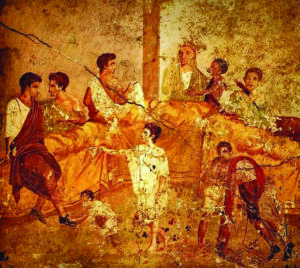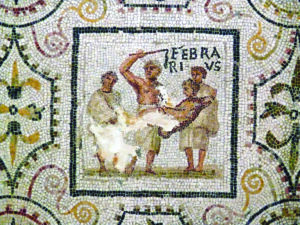February gets no respect.
Cold and short, misspelled and mispronounced. Few songs sing of February, none of them good, and the handful of poems about it tend to the gloomy. Oh, February never says anything, but you know it’s got to hurt. It’s the low season at its lowest, and it was ever thus.
“The Romans invented February, but not right away, and then only for the sake of symmetry.”
The Romans invented February, but not right away, and then only for the sake of symmetry. For centuries the Roman calendar contained only 10 months, ending with December and resuming in March, the dreary span between being deemed unworthy of name and note. Enter Numa Pompilius, the second king of Rome, who got it into his head that the calendar should reflect the year’s 12 lunar cycles and, on or about 713 B.C., decreed Januarius and Februarius into existence.

If shoehorning a couple of extra months into the winter doldrums sounds simple enough, it presented Pompilius with certain numerological complications. The Romans considered even numbers unlucky. Previously, all months were either 29 or 31 days long, with the slop falling harmlessly into the untitled void. With the addition of January and February, the year was packed tight with lucky odd-numbered months that didn’t add up to 365. To preserve the calendar’s credibility, somebody was going to have to take the unlucky 28-day fall.
Looking back, February was probably the obvious choice, since it happened to bracket the Republic’s annual orgy of personal and social cleansing. The name “February” derives from the Latin “februare,” meaning “to purify,” and the Romans spent most of the ill-numbered month conducting rites and rituals of introspection and sacrifice. It’s interesting, maybe even instructive, to contrast the Roman approach to February with our own.
Beginning every year on February 13, the rites of Lupercalia were intended to cleanse and sanctify the City of Rome. Each February 14, we indulge ourselves to excess on Napa Valley Chardonnay, boxed chocolates and coercive romanticism.

At about the same time in February, when the Romans were observing Caristia with a thorough spiritual scrubbing of home and household, we’re celebrating Superbowl Sunday by splashing beer and queso dip all over the family room.
And where weeklong Quirinalia sought to rid the Roman State of confusion and disorder, we spend twice that long wallowing in the confusion and disorder of Mardi Gras.
“ …there are a lot more celebrity birthdays in February than can be explained by either math or sociology.”
Undertaken each February 2, the ancient Roman solemnities of Sementivae were meant to cleanse and encourage the sacred soils upon which the Republic’s prosperity depended. Every February 2, we practice the curious customs of Groundhog Day, during which grownup persons who are legally allowed to vote and enter into contracts claim predictive mastery over global weather patterns based on the ability of an overfed marmot to perceive its own portly penumbra. And that’s not even the curious part. What’s curious is that folks have been forecasting April in February for several hundred years, at least.

“If February give much snow, a fine summer it doth foreshow,” runs one antique axiom. “Fogs in February mean frosts in May,” assures another. And this from the Old Farmer’s Almanac: “If Candlemas Day be mild and gay, go saddle your horses and buy them hay. But if Candlemas Day be stormy and black, it carries the winter away on its back.” It looks like maybe Punxsutawny Phil stole his act from forecasters of yore, not to mention co-opting Candlemas Day from the Christian calendar.
The Romans were a pretty sharp crew, but in this our Enlightened Age, we’re a little too sophisticated for dated notions of Providence. Then again, February was certainly unlucky for Socrates, who was sentenced to death on February 15, 399 BC. And it wasn’t very lucky for women of property in Salem, Massachusetts, as the Witch Hunts began in February, 1692. When a chartered airplane carrying Buddy Holly, Richie Valens and the Big Bopper most unluckily crashed and burned in an Iowa cornfield on the night of February 3, 1959, it came to be known as “The Day the Music Died.” And February 14 got .45-caliber-unfortunate fast when seven members of Chicago’s North Side Gang were Tommy-gunned down by rival mobsters in a Lincoln Park garage, an unlucky event remembered today as the Saint Valentine’s Day Massacre. And anybody who’s ever massacred an entire productive morning surfing social media will surely consider February 4, 2004 a black day, indeed. That’s the day Mark Zuckerberg unleashed Facebook.

But, if we were to accept Pompilius’s judgment—and nobody’s saying we are—then it’s natural to wonder if people born in the only month capable of having no full moon are themselves unlucky. Research suggests otherwise. According to one 7-year study of 21,000 children, babies born under Aquarius and Pisces arrive larger, develop faster, behave better, and by age 7 score higher on intelligence tests than their peers. What’s more, there are a lot more celebrity birthdays in February than can be explained by either math or sociology.
For what it’s worth, the Center for Disease Control says fewer children are born in February than in any other month, and not just because it’s short. A survey of Februarian career choices place artist and traffic cop at the top of the roster. People born in February are less likely to have neurological problems, but are at higher risk of cardiovascular disease. And if you happen to be among the 1 in 1,461 people born on Leap Day, February 29, you’re at higher risk of getting rooked on birthday swag.
Poor little Februarius, the frosty rump of winter, dreary perdition between better times. It’s not a bad month if you give it a chance. All it wants is a little respect.
I told my psychiatrist that everyone hates me. He said I was being ridiculous – everyone hasn’t met me yet.
—Rodney Dangerfield




